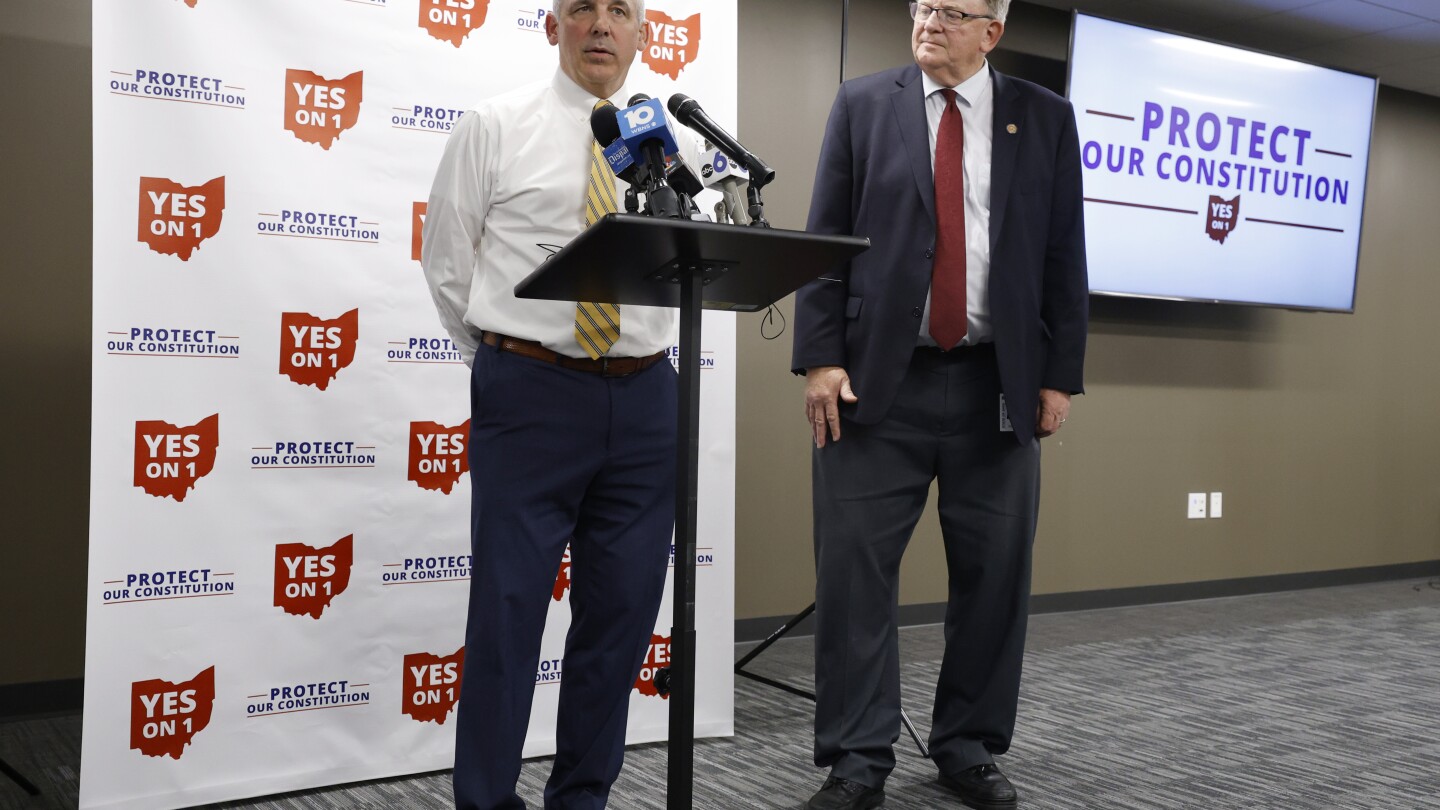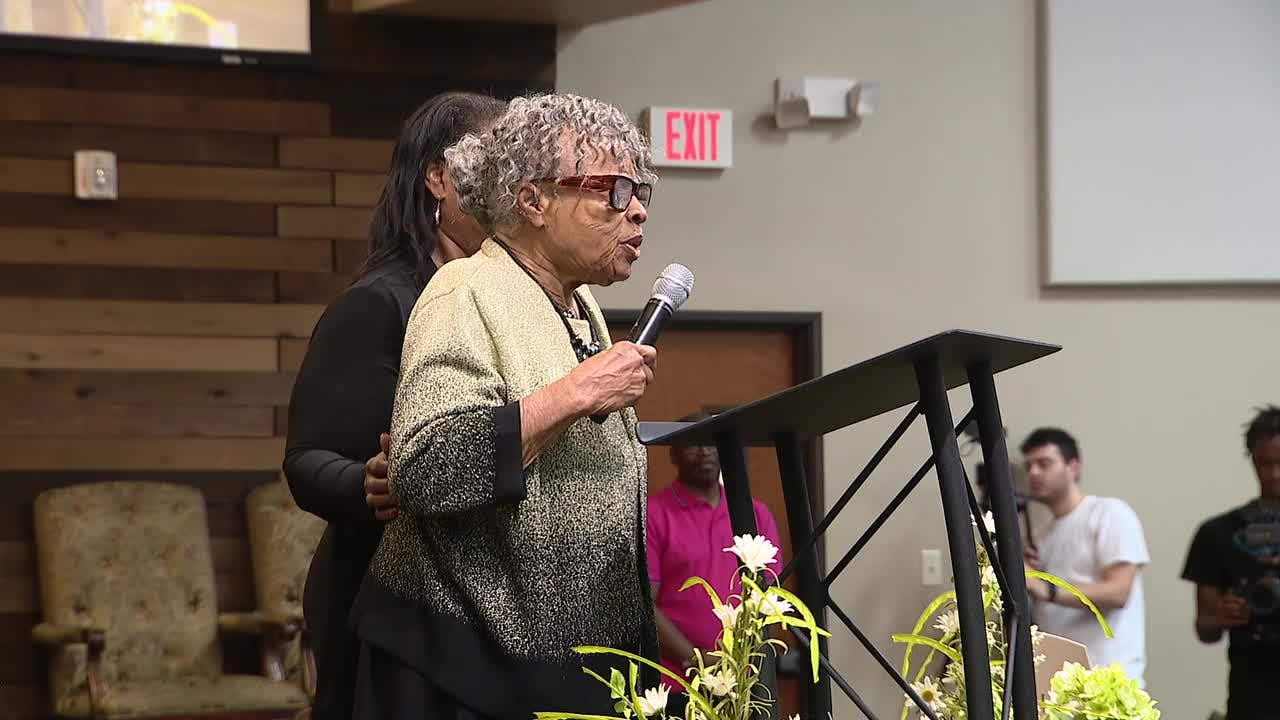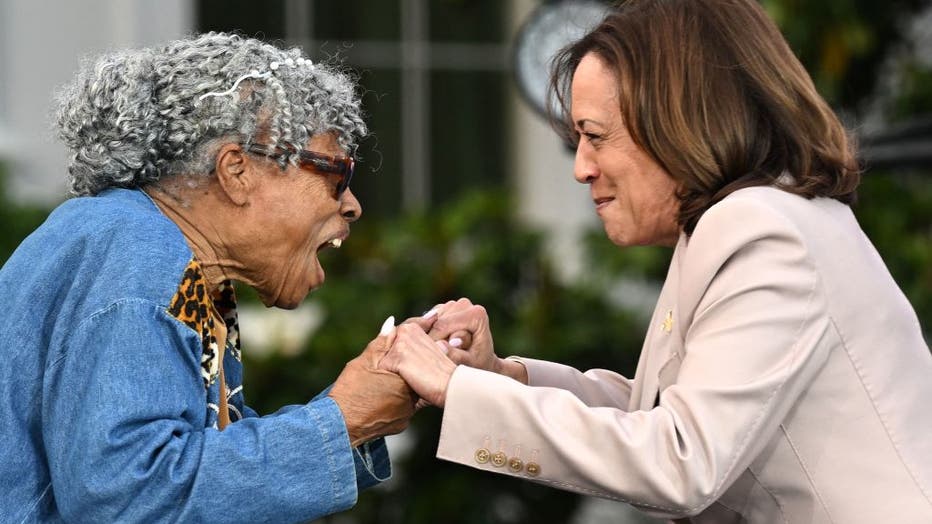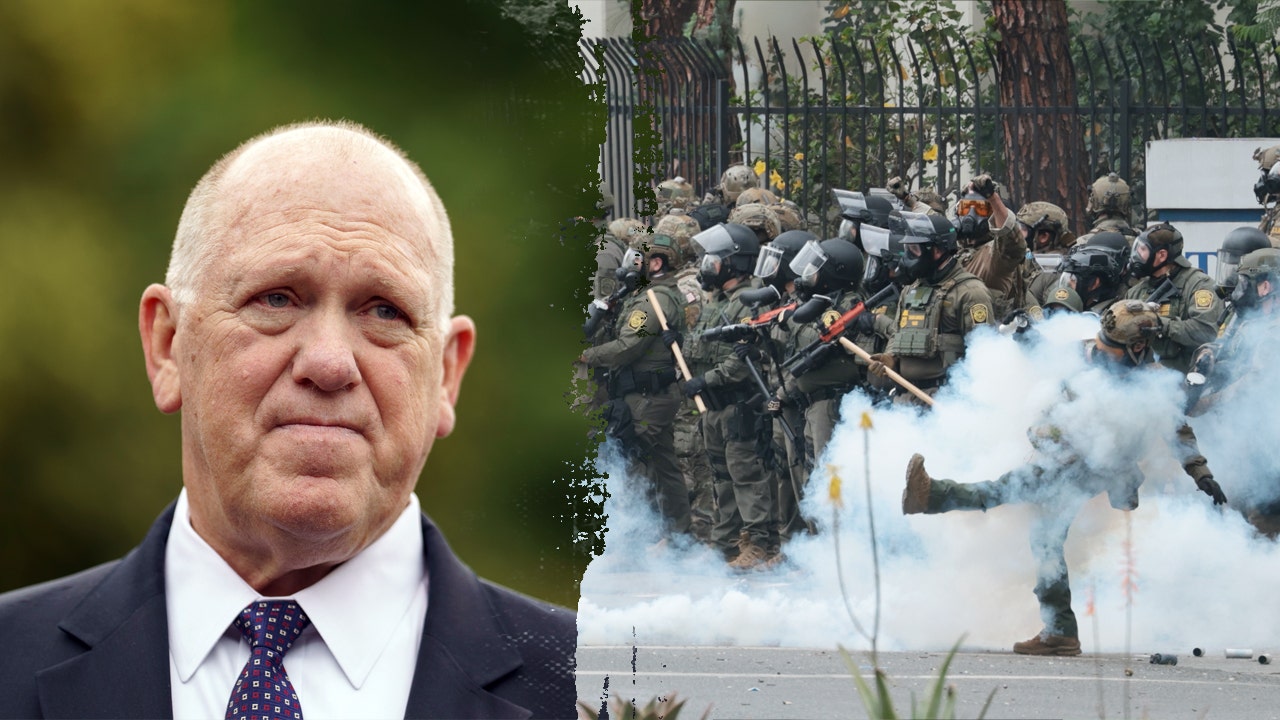Ohio
The failed Ohio amendment reflects Republican efforts nationally to restrict direct democracy

COLUMBUS, Ohio (AP) — After Ohio voters repealed a law pushed by Republicans that would have limited unions’ collective bargaining rights in 2011, then-GOP Gov. John Kasich was contrite.
“I’ve heard their voices, I understand their decision and, frankly, I respect what people have to say in an effort like this,” he told reporters after the defeat.
The tone from Ohio Republicans was much different this past week after voters resoundingly rejected their attempt to impose hurdles on passing amendments to the state constitution — a proposal that would have made it much more difficult to pass an abortion rights measure in November.
During an election night news conference, Republican Senate President Matt Huffman vowed to use the powers of his legislative supermajority to bring the issue back soon, variously blaming out-of-state dark money, unsupportive fellow Republicans, a lack of time and the issue’s complexity for its failure.
He never mentioned respecting the will of the 57% of Ohio voters across both Democratic and Republican counties who voted “no” on the Republican proposal.
The striking contrast illustrates an increasing antagonism among elected Republicans across the country toward the nation’s purest form of direct democracy — the citizen-initiated ballot measure — as it threatens their lock on power in states where they control the legislature.
Historically, attempts to undercut the citizen ballot initiative process have come from both parties, said Daniel A. Smith, a political science professor at the University of Florida.
“It has to do with which party is in monopolistic control of state legislatures and the governorship,” he said. “When you have that monopoly of power, you want to restrict the voice of a statewide electorate that might go against your efforts to control the process.”
According to a recent report by the nonpartisan Fairness Project, Ohio and five other states where Republicans control the legislature — Arizona, Arkansas, Florida, Missouri and North Dakota — have either passed, attempted to pass or are currently working to pass expanded supermajority requirements for voters to approve statewide ballot measures.
At least six states, including Ohio, have sought to increase the number of counties where signatures must be gathered.
The group found that at least six of the 24 states that allow ballot initiatives have prohibited out-of-state petition circulators and nine have prohibited paid circulators altogether, the group reports.
Eighteen states have required circulators to swear oaths that they’ve seen every signature put to paper. Arkansas has imposed background checks on circulators. South Dakota has dictated such a large font size on petitions that it makes circulating them cumbersome.
Sarah Walker, policy and legal advocacy director for the Ballot Initiative Strategy Center, said Republicans in Ohio and elsewhere are restricting the ballot initiative process in an era of renewed populism that’s not going their way. She said conservatives had no interest in amending the ballot initiative process when they were winning campaigns in the 1990s and early 2000s.
“Since then, you’ve seen left-leaning organizations really developing their organizational skills and starting to win,” she said. “The reason given for restricting the ballot initiative is often to insulate the state from outside special interests. But if lawmakers are interested in limiting that, there are things they can do legislatively to restrict those groups, and I don’t see them having any interest in doing that.”
Aggressive stances by Republican supermajorities at the Ohio Statehouse — including supporting one of the nation’s most stringent abortion bans, refusing to pass many of a GOP governor’s proposed gun control measures in the face of a deadly mass shooting, and repeatedly producing unconstitutional political maps — have motivated would-be reformers.
That prompted an influential mix of Republican politicians, anti-abortion and gun rights organizations and business interests in the state to push forward with Tuesday’s failed amendment, which would have raised the threshold for passing future constitutional changes from a simple majority to a 60% supermajority.
Another example is Missouri, where Republicans plan to try again to raise the threshold to amend that state’s constitution during the legislative session that begins in 2024 — after earlier efforts have failed.
Those plans come in a state where state lawmakers refused to fund a Medicaid expansion approved by voters until forced to by a court order, and where voters enshrined marijuana in the constitution last fall after lawmakers failed to. An abortion rights question is headed to Missouri’s 2024 ballot.
Ohio Secretary of State Frank LaRose is among Republicans in the state who cast Issue 1 as a fight against out-of-state special interests, although both sides of the campaign were heavily funded by such groups.
He called the $20 million special election “only one battle in a long war.”
“Unfortunately,” he said, “we were dramatically outspent by dark money billionaires from California to New York, and the giant ‘for sale’ sign still hangs on Ohio’s constitution,” said LaRose, who is running for U.S. Senate in 2024.
Fairness Project Executive Director Kelly Hall said Ohio Republicans’ promise to come back with another attempt to restrict the initiative process “says more about representational democracy than it does about direct democracy.”
She rejected the narrative that out-of-state special interests are using the avenue of direct democracy to force unpopular policies into state constitutions, arguing corporate influence is far greater on state lawmakers.
“The least out-of-state venue is direct democracy, because then millions of Ohioans are participating, not just the several dozen who are receiving campaign contributions from corporate PACs, who are receiving perks and meetings and around-the-clock influence from corporate PACs,” she said.
“Ballot measures enable issues that matter to working families to actually get on the agenda in a state, rather than the agenda being set by those who can afford lobbyists and campaign contributions.”

Ohio
Obituary for Terry P. McGinnis at Davis-Turner

Ohio
Opal Lee returns to Fort Worth after Ohio hospitalization

FORT WORTH, Texas – Opal Lee, the grandmother of Juneteenth, is back in Fort Worth after being admitted to the hospital in Ohio.
Opal Lee returns home
The 98-year-old returned home from her out-of-state hospital stay on Monday evening.
Dionne Sims, Lee’s granddaughter, says the 98-year-old has been resting, reading and staying in bed.
For now, she is not doing any interviews to give her time to rest.
What they’re saying:
“I think one of the things she is most encouraging young people to do is to take Juneteenth, take the baton and go forward. you’ll hear that, she’s always said it. I think we just need to pay attention to what she said. She always said It’s not a me thing. It’s a we thing,” said Sims.
Kamala Harris calls Opal Lee

US Vice President Kamala Harris (R) greets US teacher and activist Opal Lee prior to a Juneteenth concert on the South Lawn of the White House in Washington, DC, on June 13, 2023. (Photo by ANDREW CABALLERO-REYNOLDS/AFP via Getty Images)
There is one call that Lee did take.
Former vice president Kamala Harris called after she heard about her hospital stay.
What they’re saying:
“She had a big smile on her face, right. To think that the former vice president, would call to check in on her, really, it made us feel special. We all know that she is, but I don’t think she realizes she is,” Sims said.
Walk for Freedom
Lee’s health is leading to some changes for her Juneteenth festivities, including her Walk for Freedom on June 19.
She will still take part in the walk, but will be in a golf cart.
What they’re saying:
“It was always the plan to have my grandmother in a golf cart, one so we can finish in a timely manner, but it’s just time,” Sims said. “It is named for her but we definitely don’t want to wear her out, so I think that is the name of the game, to keep her here as long as possible.”
The Source: Information in this article comes from an interview with family members of Opal Lee.
Ohio
Ohio Patrol helicopter video captures men throwing package over youth prison fence

Infrared cameras mounted to a state patrol helicopter recorded two men chucking a package over the fence at an Ohio youth prison
Troopers tracks suspects seen throwing package over youth prison fence
An Ohio Highway Patrol helicopter caught two men throwing a package outside the Circleville Juvenile Correctional Facility.
- Two men were caught on infrared camera throwing a package over the fence at Circleville Juvenile Correctional Facility.
- The package contained THC vape pens, cell phones, and an external battery.
- Several individuals, including a former DYS deputy superintendent, face charges related to the incident.
- The former DYS employee allegedly purchased the contraband and had inappropriate relationships with incarcerated teens.
Infrared cameras mounted to an Ohio Highway Patrol helicopter recorded two men throwing a package over the fence at a state juvenile prison and then running through a field to evade capture.
The footage shows how troopers in the air spotted and tracked the suspects, relaying information to their colleagues on the ground. The bodies of the men glow white-hot in the footage, which allowed troopers to follow them even as one tried to hide in the woods.
Youth prison officials monitoring phone calls picked up on a plan to throw drugs over the fence at Circleville Juvenile Correctional Facility the night of Nov. 8, 2024. The Ohio State Highway Patrol’s aviation unit, on the ground troopers and DYS officials caught Korrell Bush allegedly throwing a package containing 15 THC vape pens, three cell phones, phone cables and an external cell phone battery over the fence.
Bush, now 21, has pleaded not guilty to illegal conveyance and receiving stolen property charges. His trial before Pickaway County Judge Matthew Chafin is scheduled for Sept. 18.
James Wilson and Juano Peyton, both now 19, pleaded guilty to complicity to illegal conveyance and Brandon Mitchell, 20, has a plea hearing scheduled for June 11.
A former Ohio Department of Youth Services deputy superintendent is scheduled to go on trial June 16 in the case. Renee Depalo, 39, of Massillon, has pleaded not guilty to complicity to convey contraband into a state prison, which is a third-degree felony.
The Ohio Department of Youth Services investigated allegations that Depalo had inappropriate relationships with incarcerated teens, including Wilson. Depalo, who worked at Indian River Juvenile Correctional Facility where Wilson had been previously incarcerated, resigned her state job May 18, 2024.
According to investigations conducted by DYS and the patrol, Depalo purchased the vape pens and cell phones at Wilson’s direction and provided them to Bush. Investigators also reported that Depalo and Bush exchanged text messages, though Depalo told troopers that she didn’t know the items were going to be thrown over the fence into the youth prison.
Ohio operates three youth prisons for children adjudicated for offenses that would be felonies if they were adults.
State government reporter Laura Bischoff can be reached at lbischoff@gannett.com and @lbischoff on X.
-

 News1 week ago
News1 week agoVideo: Faizan Zaki Wins Spelling Bee
-

 News1 week ago
News1 week agoVideo: Harvard Commencement Speaker Congratulates and Thanks Graduates
-

 Politics1 week ago
Politics1 week agoMichelle Obama facing backlash over claim about women's reproductive health
-

 Technology1 week ago
Technology1 week agoAI could consume more power than Bitcoin by the end of 2025
-

 News1 week ago
News1 week agoPresident Trump pardons rapper NBA YoungBoy in flurry of clemency actions
-

 Technology1 week ago
Technology1 week agoSEC drops Binance lawsuit in yet another gift to crypto
-

 Technology1 week ago
Technology1 week agoOpenAI wants ChatGPT to be a ‘super assistant’ for every part of your life
-

 World1 week ago
World1 week agoTwo killed in Russian attacks on Ukraine before possible talks in Turkiye
















